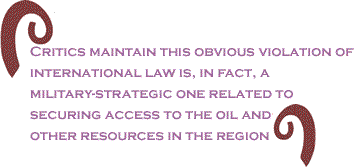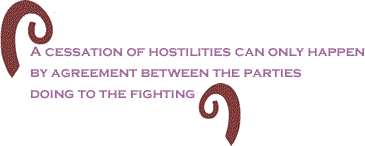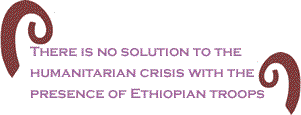
|
|||||||||||||||||||||
 |
|||||||||||||||||||||
|
||||||||||
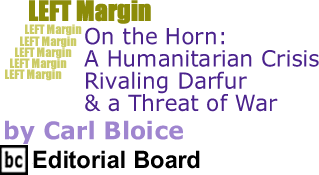 |
||||||||||
 |
||||||||||
|
||||||||||
The current issue is always free to everyone If
you need the access available to a |
||||||||||
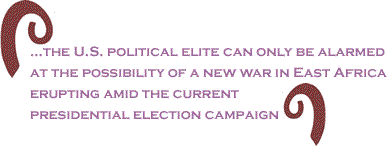 |
||||||||||
In early November, the State Department’s point person for the Horn of Africa was going around saying political changes in Somalia had created a “new opportunity” for ending the civil conflict there. One month later, her boss was in the country’s capital, Mogadishu, pleading with the officials the U.S. has installed there to take steps to ease the crisis. While it’s been steadily ignored by the major U.S. media, the situation in the Horn of Africa region has deteriorated into what international aid officials as calling a “humanitarian” crisis” comparable to Darfur and has greatly increased the threat of a regional war. There has been a tone of desperation in Secretary of State Condoleezza Rice’s recent statements in and about Somalia - with good reason. In addition to the crisis in Somalia itself, Rice’s foray into the region takes place against the backdrop of growing international and congressional disquiet over armed conflict and human rights violations in Ethiopia and the escalating border dispute with neighboring Eritrea. If the Bush Administration is truly concerned about creating a perception that it is trying to move matters forward in the Middle East while it is still in power, the White House and the U.S. political elite can only be alarmed at the possibility of a new war in East Africa erupting amid the current presidential election campaign. The finger of blame would immediately be directed to the Administration and the decision a year ago to team up with the authoritarian client government in Ethiopia to invade and occupy Somalia. In the haughty imperial manner the Rice State Department usually displays, U.S. Assistant Secretary of State for African Affairs, Jendayi Frazer, was out front in November in welcoming the resignation of Somalia’s then nominal Prime Minister Ali Mohamed Gedi. Of course, Frazer did not allow that the U.S. had anything to do with his stepping down. She said it had created "an important new dynamic” in the country, adding, “We hope that a very capable person, really someone who can bring the communities together, will be selected” to succeed Gedi. She suggested the departing prime minister had lost the confidence of “the United States and international community.” When asked what Transitional government President Abdullahi Yusuf Ahmed and the Somali parliament should do to get a prime minister who will have the confidence of both the president and Washington, Frazer declared: "We've said over and over and over again that Somalia's future - a future of stability - depends on reconciling the various communities, whether they are political communities, ideological, the different clans, civil society groups, intellectuals, religious authorities, all [of those groups] need to come together. So we need a prime minister who can bring those communities together, and that is what the United States is looking for."
Never mind the little matter of whether the U.S. has any right to be dictating political decisions in a country half way around the world, that’s sort of taken for granted these days. Never mind the audacity of Frazer claiming to speak in the name of “the international community.” The Administration claims that U.S. involvement
in Somalia is related to its ongoing “war on terror” and that
the joint U.S. Ethiopian invasion of the country was aimed
at supposed Islamic
terrorists being In reality, what Assistant Secretary Frazer said she saw as a new opportunity turned out to be a mirage. Last week, Rice herself ventured into the Somali capital, calling for the withdrawal of Ethiopian troops and a cease fire and appealing to other countries in Africa and beyond for help in untangling the mess her administration’s actions had created. She told the new prime minister, Nur Hassan Hussein, the U.S. wants a new Somali government installed following the drafting of a new constitution and an electoral law and she wants all this before the end of January. "I think everyone understands the difficulty of the job ahead of you but also that you are a respected leader, and the importance of broadening the political basis for reconciliation in Somalia," Rice forcefully told the provisional government head. He, in turn, promised to work hard toward making his government more “inclusive.”
However, creating a more diverse cabinet and attaining the “cease fire” Rice ordered up are two different things. A cessation of hostilities can only happen by agreement between the parties doing to the fighting. Holding talks with the other side, the dissenting clans angered at being shut out of the government and the opposition, including the Union of Islamic Courts, is the only way cessation of hostilities can come about. Transitional government leaders still refuse to talk peace with the opposition Alliance for the Re-Liberation of Somalia, which includes former members of parliament, religious and community leaders, prominent academics and members of the Somali Diaspora. The U.S. activities in the Horn are not unrelated to the newly created U.S. Africa Command (Africom) and thus they are being closely watched across the continent. Engineering an invasion of a sovereign country, supporting its occupation in the face of overwhelming opposition from the people, attempting to dictate the shape of the country’s government and lusting after its natural resources: this is the face of Africom. This is what many Africans see when they look at the intrusion of the Pentagon into the continent following on the heels of the State Department, like colonialists in the wake of missionaries. And then come the merchants of death. “The African arms market, traditionally recognized for its low value and opaque business environment, may represent tomorrow's growth market for the global defense industry, according to Forecast International's Africa Market Overview report," reported Space Wars, December 5th. “Driven by changing geopolitical environments and enabled by hydrocarbon-derived wealth, select African nations are attempting to re-capitalize their military and security forces in a way that potentially creates major opportunities for western defense enterprises.” Some observers fear that the setting up of Africom and its offer of military training and equipment to various regimes will quickly turn the region in an arms bazaar. African defense spending as a whole is expected to increase 3.5 percent year-on-year from $13.9 billion in 2007 to over $15.9 billion in 2011. As less than 20 percent of defense spending is allocated for procurement, the spending increase translates into a market value of $2.8 to $3.2 billion over the four year period. "The African arms market is currently a fraction of the value of any other regional market, but looking at the confluence of burgeoning security requirements and vast oil and [natural] gas reserves in the context of high energy prices and it becomes readily apparent that there is a collection of Africa nations demonstrating procurement characteristics reminiscent of the Middle East three decades ago," wrote the author of the Forecast International report, Matthew Ritchie.
For months now, the U.S. has been trying to get other African governments to send troops to augment the forces of the so-called African Union Mission to Somalia, offering cash incentives. Thus far this has been to little avail. A contingent of 1,600 Ugandan troops has been on hand since shortly after the invasion but they are reported largely occupied with guarding the Mogadishu airport. With the rump government installed in the Somali version of the “Green Zone” and open guerrilla warfare in the streets, they could hardly carry out any military mission without taking sides in the civil conflict. This is the main reason no other African country has offered up its sons for the mission. “We hope that Burundians will deploy sometime this month,” said Frazer. “… We have provided about $19 million so far to try to assist the countries Uganda and Burundi. We are training two battalions of Burundians, we've procured equipment for those battalions, and we will assist in their deployment. And so we are working with other governments.” One month later it was still just the Ugandans. Rice was in the Ethiopian capital Addis Ababa last week for five days of talks with representatives of various African countries. While the discussions covered conflicts in eastern Congo, Sudan and Somalia, clearly a key task before her was preventing a war between Ethiopia and Eritrea. The two countries fought a border war between 1998 and 2000 that left 70,000 people dead. "I also urged the prime minister to avoid any acts that might heighten friction between Eritrea and Ethiopia and to take concrete steps to lessen tensions on the border,” Rice said. “There must not be a resumption of hostilities initiated by either side.” The U.S., Reuters noted, has been accused in the past of siding with Addis Ababa in the conflict. Meanwhile, conditions in Somalia could hardly get much worse. Over one million people have become internal or external refugee since the Ethiopian occupation got underway, prompting the United Nations to term the situation the worst humanitarian crisis in Africa. According to the BBC, the prices of basic goods have shot up so much that many Somalis cannot afford to buy food, leading to widespread malnutrition. And, as if the aid situation in Somalia were not bad enough, President Abdullahi Yusuf is reported by international aid officials to have ordered restrictions that prevent food aid from being distributed in parts of the country. Ports and airports have been closed, shutting out aid convoys. Aid agency staff personnel are said to be barred from traveling to the areas most in need to food and medicines. Brutality and human right violations are being laid at the feet of both sides. However, "Ethiopia has a functioning government that should be accountable," a senior UN official responsible for Somalia, told the British Guardian. "We tried talking to Ethiopia, even at ambassador level, but we get nowhere. It seems that they, like the other parties, can get away with anything in this dirty war."
New York-based Human Rights Watch has accused Ethiopian forces of violating the laws of war by indiscriminately bombing densely populated parts of Mogadishu and deliberately shooting civilians. "There is no solution to the humanitarian crisis with the presence of Ethiopian troops," said Georges-Marc Andre, the European Union's special envoy to Somalia. Given the situation being described, one can only wonder at the scant attention being paid to the region by the major U.S. mass media. One would think that with a humanitarian crisis rivaling Darfur and the looming threat of a renewal of a border between Ethiopia and Eritrea, we would be told more about it. BlackCommentator.com Editorial Board member Carl Bloice is a writer in San Francisco, a member of the National Coordinating Committee of the Committees of Correspondence for Democracy and Socialism and formerly worked for a healthcare union. Click here to contact Mr. Bloice. |
||||||||||
| December
13, 2007 Issue 257 |
|
| Printer Friendly Version in resizeable plain text format format |
 |
 |
 |
| |
| |





















